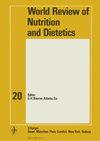How does the U.S. Government violate the infant formula marketing code?
4区 医学
引用次数: 0
Abstract
The United States’ Special Supplemental Nutrition Program for Women, Infants, and Children, commonly known as WIC, is based in the United States Department of Agriculture (USDA). It provides services to about half the infants born in the country, with many of them getting subsidized infant formula. WIC manages this in close collaboration with major manufacturers of formula. This commentary examines WIC’s practices in relation to the International Code of Marketing of Breastmilk Substitutes and concludes that the United States is a major violator of the aims and principles of the Code.美国政府如何违反婴儿配方奶粉营销法规?
美国妇女、婴儿和儿童特殊补充营养计划,通常被称为WIC,总部设在美国农业部(USDA)。它为该国大约一半的婴儿提供服务,其中许多婴儿获得了婴儿配方奶粉的补贴。WIC与主要配方奶粉制造商密切合作,管理这一工作。本评论审查了世卫组织在《国际母乳代用品销售守则》方面的做法,并得出结论认为,美国是违反《守则》宗旨和原则的主要国家。
本文章由计算机程序翻译,如有差异,请以英文原文为准。
求助全文
约1分钟内获得全文
求助全文
来源期刊

World review of nutrition and dietetics
Nursing-Nutrition and Dietetics
自引率
0.00%
发文量
114
期刊介绍:
Volumes in this series consist of exceptionally thorough reviews on topics selected as either fundamental to improved understanding of human and animal nutrition, useful in resolving present controversies, or relevant to problems of social and preventive medicine that depend for their solution on progress in nutrition. Many of the individual articles have been judged as among the most comprehensive reviews ever published on the given topic. Since the first volume appeared in 1959, the series has earned repeated praise for the quality of its scholarship and the reputation of its authors.
 求助内容:
求助内容: 应助结果提醒方式:
应助结果提醒方式:


